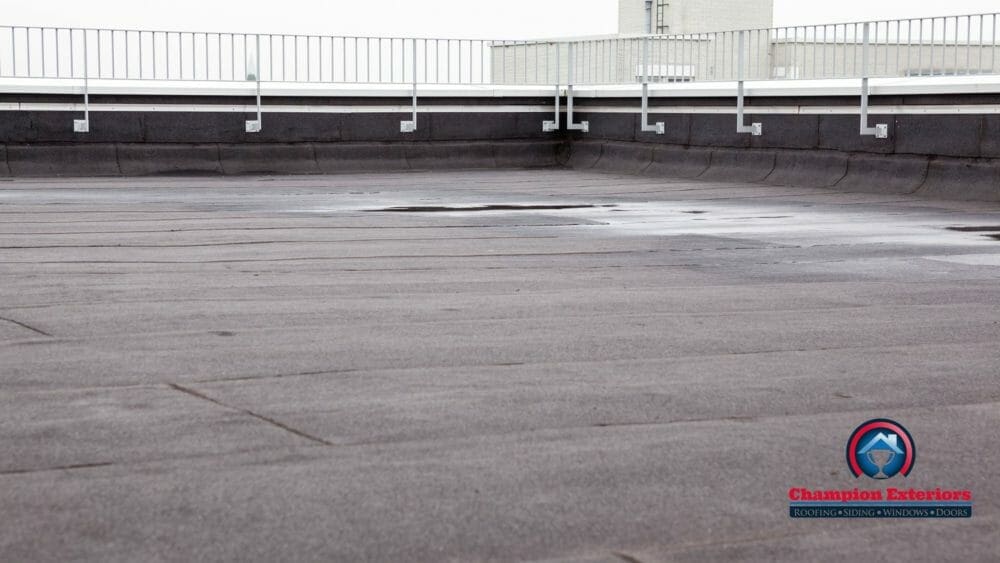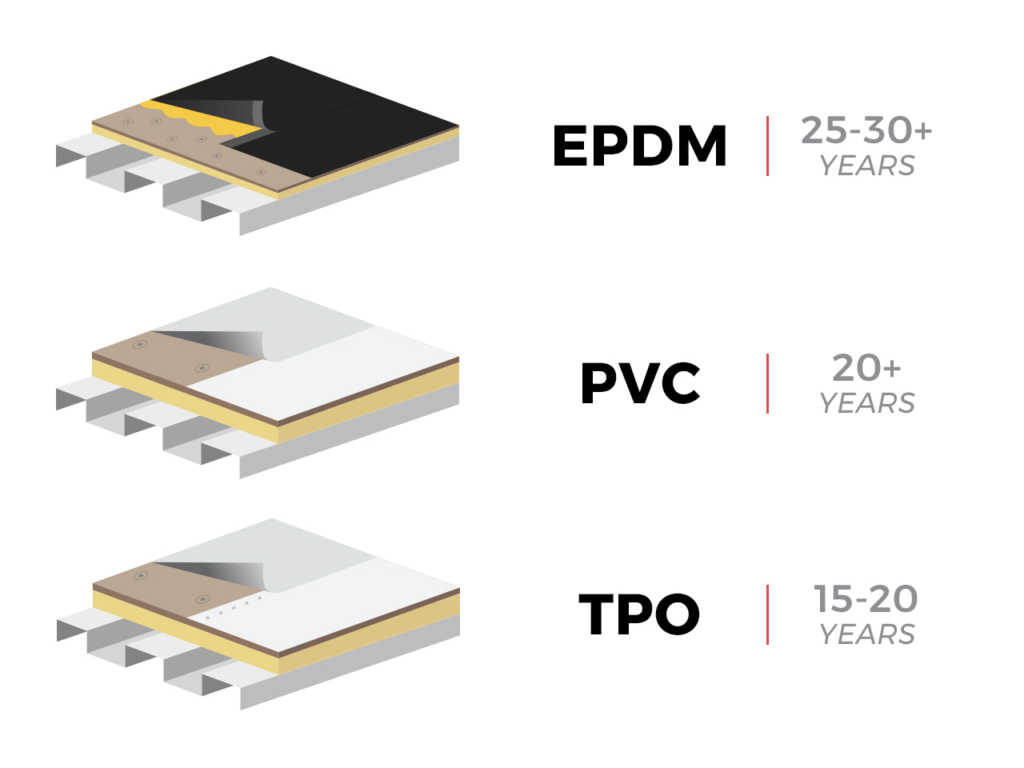If you try to imagine a roofing system, the image of a pitched roof is likely to come into your mind 9 times out of 10. However, not all roofs are pitched in nature. Nowadays, flat roofs are becoming more common.
When you think of flat roofs, you probably picture a suburban ranch house or a commercial property. The truth is that flat roofs can now be found everywhere—from small cottages and bungalows to the high-rise apartments in the city. If you have a flat roof, or are looking to install one, here are some things you should know about how they work, how to maintain them, and much more.
Flat Roofs Are Not Actually Flat!
Let’s start with a fun fact! Contrary to popular belief a flat roof is not completely flat in nature. They are almost level, but they do have a slight slope. You can expect a slope of about ¼ or ½ inch in a flat roofing system. This is necessary to facilitate the flow of water down the roof. Due to this reason, these roofing systems are sometimes called low-sloped roofs.
Flat Roofs Are A Popular Choice For Commercial Spaces
Though you will not find many houses with a flat roof, these are a staple when it comes to commercial roofing. Flat roofs are a popular choice for commercial buildings because they provide a large, open space that’s perfect for stores, restaurants, and other businesses. Flat roofs are highly durable, and a great choice for any commercial property.
There has been some change in the roofing industry, and you will notice that these types of roofs are getting quite popular in residential areas of North America as well.
Pros Of Flat Roofs
A Flat Roof Is Cost Friendly
One of the biggest advantages of flat roofs is that they are generally less expensive to install than other roofing materials used in a pitched roofing system. Flat roofs often have a lower initial cost, and this can be attributed to the fact that they don’t require the use of materials such as shingles or tiles. Shingles and tiles generally add a few dollars per square foot in terms of installation costs, while flat roofs tend to be completely devoid of these expenses. Flat roofs typically require less material and are less labor-intensive to install, which can lower their overall cost. If you’re trying to keep costs low, and your roof isn’t seeing a high volume of traffic, then a flat roof might be the best option for you.
Faster To Install
Affordability is a key concern while you look for roofing contractors who will install a flat roof on your commercial property. However, when you run a business, it is important to find a roofing system that can be installed quickly.
A Flat roof is one of the easiest and quickest roofing systems to install. If you’re building a new property, and considering installing a flat roof, you will find that they are easier to install than a pitched roof. When the pitch of your roof isn’t an issue, the roof installation process tends to go much smoother.
More Storage
Flat roofs are great for storage. If you have limited space in your property, a flat roof can be used as an extension of your usable space. This is why that are used for commercial property. Flat roofs can be used for solar panels to generate energy for the house, or for greenhouses.
Cons Of Flat Roofs
A flat roof is a great option if you’re looking for a low-cost and easy-to-maintain roof that will last for years to come. However, before you make the decision to install one in your home, there are some limitations to consider as well.
Prone To Water Damage
One of the biggest disadvantages of a flat roof is that it is more prone to water damage. A flat roof can experience significant damage during the rainy season, or during the winter when snowfall is common. Since there is almost no slope, there is a chance that the water will not flow off your roof effectively, i.e, the water will pool and can cause damage.
Standing water is not good for any roof. If a flat roof is not installed correctly, the water tends to run off in one direction instead of draining away from your property. This means that water can pool in specific areas, which can lead to problems such as mold growth, rot or even structural damage if left untreated. This can damage the structural integrity of your roof, and can lead to leaks or other costly problems.
Constant Maintenance
Maintenance can be an area of concern if you have a flat roof. Flat roofs need to be cleaned regularly, repainted regularly, and inspected regularly to ensure that they are in good condition. People who have had a flat roof installed must also constantly check for pooling water. If you have a flat roof, you can expect to spend more time and money on maintenance than the average person would spend with a sloped roof.
Less Lifespan
One of the most important things you may expect from your roof is long-term performance. However, most of the materials used in a flat roofing system do not have a long-term lifespan.
Because they don’t have any valleys or ridges, the water can’t run off as quickly; this means that it stays on the surface longer and may cause damage to your building. Also, their durability can come into question in harsh weather conditions.
However, due to multiple technological advancements, various flat roof materials such as EPDM do have a good lifespan.
Less Variety
Flat roofs are, in general, less aesthetically pleasing than other types of roofs. They lack the charm and character that can be found in sloped roofs, pitched roofs, and hipped roofs. Flat roofs are typically not available in many different colors. For example, an EPDM roof is mostly available in black, and TPO is available in white and other lighter shades.
Flat roofs tend to have fewer options for design elements, such as dormers or decorative shingles and tiles.
Types Of Flat Roofs
If you decide to install a flat roof, then you will come across a variety of roofing materials that you can choose from. We have listed some of the most popular flat roof materials below:
TPO
TPO stands for thermoplastic polyolefin. It is a kind of polymer or a filler that is made from polypropylene. TPO roofing systems are a polyester-based synthetic rubber. It is a single-ply system, and one of the most popular flat roofing materials on the market.
Since it is a single-ply system, it contains just one layer of synthetic material, and is manufactured in the form of sheets.
If you are installing a TPO roof on your property, it is best to choose a roofing contractor that has experience working with this type of material. Due to its composition, TPO is a tough and durable roofing material.
In addition to its durability, the TPO roof system is resistant to ultraviolet rays, which is its primary benefit. It provides superior resistance against weather, insects, and other pests.
EPDM
EPDM is one of the most popular roofing materials used today, and one that you should strongly consider if you are installing a flat roof on your property. EPDM is a great option for commercial properties with a flat roof.
EPDM stands for Ethylene Propylene Diene Monomer, which is also its composition. It is a type of synthetic rubber that not only has wide applications in the roofing industry, but in several other industries as well.
An EPDM roofing system uses a rubberized membrane, which is applied to the existing structure with the help of an adhesive or sealant. The EPDM rubberized membrane is manufactured using ethylene propylene diene monomer and butadiene.
The material is so versatile because it can be purchased in a number of widths and thicknesses, and comes in multiple colors. It’s also incredibly durable and cost-effective
Modified Bitumen
Though this may not be as popular as TPO and EPDM, it is still used by both homeowners as well as business owners. This roofing material is made from bitumen, a black-sticky-like substance, and it is also used while manufacturing some different types of asphalt shingles. Modified bitumen has been around since the 1960s—it was developed by scientists who wanted an alternative material for asphalt shingles that could withstand extreme weather conditions such as high winds or heavy snowfall without tearing apart. It has become one of the most popular roofing materials for business owners installing a new roof.
Metal Roof
If you own a commercial building or a residential property, a metal roof is one of the best roofing systems you can install.
Metal roofs are the most common type of flat roof, and they come in many different variations. They’re made of metal sheets that are either rolled or folded into shape, with an insulation layer under them to keep the roof warm in the winter and cool in the summer. Metal roofs are good for flat roofs because they’re durable, easy to install and maintain, and can protect your roof for a long period of time.
Unlike other popular commercial roofing materials, a metal roof is available in a variety of colors. However, a metal roof is often costly.
Built-Up Roof
A built-up roof is a type of roofing system that is made from multiple layers of materials. The layers are glued together to form a strong roofing system.
A built-up roof is a flat roof that is composed of several layers of materials. The most common type of built-up flat roof is a built-up tar and gravel roof. On these roofs, the gravel layer acts as an insulating layer and helps to prevent ice dams in cold climates.
Cost Of Flat Roofs
No matter how much research you do, in the end, the cost of installing a flat roof will likely play a major role in determining which roof system you choose. The cost of a flat roof depends on these factors:
Size
The larger the area covered by your flat roof, the more expensive it will be. That’s because larger areas require more materials and labor to properly install your new roof.
Complexity
The size of your roof might be the most important factor, but the complexity of the job can be an influential factor in determining the cost(more complex jobs take longer and cost more).
Type Of Roofing Material
The cost of your roof can be directly tied to the roofing material you choose. For example, TPO, as well as a metal roofing material, are more expensive than others. If you want to save money on your flat roof, choose a material that doesn’t require as much maintenance and lasts longer.
Maintenance Is Important When Considering A Flat Roof
Flat roof maintenance is crucial for your property. Not only does it keep your roof looking great, but it also protects your home or business from the elements, which can be a costly problem if you have a flat roof.
Are You Looking For a Flat Roofing Company?
Now that you know some important facts about flat roofs, you can make an informed decision. If you want to install a new flat roof in New Jersey, make sure that you contact Champion Exteriors.
We’ve been providing our clients with high-quality roofing services since 1936, and we want to help you too. With us, you will get access to professional workmanship and the finest roofing materials including TPO and EPDM.
We can also help you decide which roofing materials are best suited for your specific property, and provide an accurate estimate for the installation cost of your commercial flat roof system as soon as possible!
Contact us today at (609) 845-3576, and one of our professional representative will be happy to assist you.



